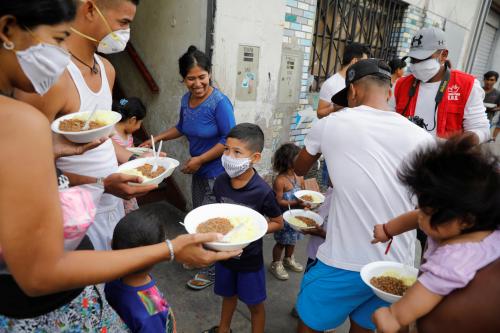There is a lesson from the coronavirus that is front and center—the centrality of government. On a daily basis we see demonstrated the critical role of government, and the difference between strong, smart leadership from government officials who have society’s interest in mind and those that are slow to respond.
Looking beyond the daily headlines focused on the actions or inadequacies of government leaders, there is a companion lesson—the equally critical role of civil society and the hundreds/thousands of formal and informal networks that are sustaining our physical and mental health. The first responders acting as part of established organizations or citizens collaborating spontaneously to meet urgent needs; the many organizations and individuals that are providing patterns for protective masks so they can be made at home; the two college students who in 72 hours mobilized 1,300 volunteers (called Invisible Hands) to deliver food and medicine to the elderly and other vulnerable residents of New York City.
It is important at this time of crisis to understand, not just the value of government and the quality of its leaders—particularly as we approach a presidential election—but also the critical role of informal networks during a crisis and the rebuilding afterwards. Fortunately, a unique piece of new research helps us understand the role of informal networks in economic and social crises and restoration.
It’s not often that a book provides new insight into a long-standing topic, or, more accurately in this case, provides the rationale for long-held assumptions. “Extreme Economies” by Richard Davies is written principally for an economics audience. But it is both an economic and a sociological study that is particularly relevant today as we try to understand and deal with the coronavirus, and, in addition, for those of us working in the development field for our everyday work.
The book reviews nine micro-economies, what Davies identifies as “extreme economies.” He investigates three economies that bounded back from disaster, three that collapsed, and three that provide a window into the future.
While he does not highlight this as an overall finding, what is striking is the role of informal networks in building social trust, the glue that binds societies and nations. Davies’ stories reveal a variety and diversity of functions performed by informal networks.
Vitality
He documents how informal networks, given a flexible enabling environment that allows cultural norms and instincts to blossom, can meet community needs. He explains how following the 2004 devastating tsunami, local networks and practices, fueled restoration in Ache, Indonesia. It was the gold of women’s bangles that allowed families to finance home reconstruction, and individuals’ knowledge of local dynamics as to where to rebuild business that spurred their restoration. While donor projects played a role, they sometimes went astray: The Chinese construction of one village had many modern conveniences but was built inland away from costal activity, so the shiny new village developed no vibe and vitality.
In the refugee camp Zaatari in Jordan near the Syrian border and the Angola prison in Louisiana, illegal trading networks make life more vibrant and livable. In contrast to Zaatari, the more formal, better-designed and structured camp of Azraq, further from the Syrian border and from the nearest town, is less amenable and constrains informal networks that make life more tolerable.
Collapse
In looking at economic failures, a common thread is that adverse government decisions can interfere with the functioning of traditional networks. The village of Bajo Chiquito—an indigenous tribal area in the famously impenetrable Darien Gap in the eastern region of Panama bordering Colombia—suffered economic collapse when construction of the Pan-American Highway bypassed the area, undercutting its role as the major river transportation hub to dispersed villages. The indigenous population failed to organize around its inherent advantage—to monetize its knowledge of the terrain that could be used to guide migrants daring to cross the Darien Gap.
Kinshasa, an economic disaster from decades of malign Congolese governance, has a vibrant pirate economy. Informal, illegal networks sustain life, but only to a level just above poverty and do not make up for incompetent and corrupt government.
Glasgow in the 19th and into the 20th century was a trading and industrial hub of wealth and economic vitality centered first on tobacco trade and subsequently as the world’s foremost builder of ocean vessels. Post-World War II rebuilding of shipyards by Germany and Japan with more modern techniques deprived Glasgow of its economic competitiveness. At the same time, the design of new urban structures broke historic neighborhood networks important to the city’s vitality and support structures.
Future
Davies looks at three locales that provide insights into the future. In Akita, the most aged region in a rapidly aging Japan, civic organizations are providing the elderly with group activities that keep them physically and mentally active and alive. In Tallinn, Estonia, advanced adoption of e-government has provided the foundation for business and civic innovation. In Santiago, Chile, implementation of the economic policies of the “Chicago Boys” created an economic success story but also one of the widest economic divides in the world, bringing a sense of relative poverty and resentment of elites that has sparked spontaneous populist protests.
Lessons for crises and international development
The development community, particularly those focusing on humanitarian and fragile environments, understands the critical role of the social compact: trust between citizens and government. What has not been fully understood or received sufficient attention is the role of informal networks. They can catalyze and cement the social compact, or, where trust in government is absent, provide citizens the services and sense of community that government fails to provide.
In this time of global crisis affecting all countries, developed and developing, we would do well to take Davies’ research as a political economy guide in understanding the essential role of networks and how we can allow them to flourish, or, at a minimum, do them no harm. “Extreme Economies” is a must-read, not just for my colleagues who are practitioners and students of international development, but for anyone seized with thinking and acting to get us beyond COVID-19 and rebuild our economic and social structures.
The Brookings Institution is committed to quality, independence, and impact.
We are supported by a diverse array of funders. In line with our values and policies, each Brookings publication represents the sole views of its author(s).






Commentary
Networks: The ties that bind in times of stress
April 28, 2020